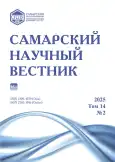The methodology of assessing the social and communicative skills of future architects in the process of business games
- Authors: Topchy I.V.1, Mironova I.A.2
-
Affiliations:
- Moscow Institute of Architecture
- Turgenev Orel State University
- Issue: Vol 14, No 2 (2025)
- Pages: 200-206
- Section: Pedagogical Sciences
- URL: https://journal-vniispk.ru/2309-4370/article/view/313706
- DOI: https://doi.org/10.55355/snv2025142310
- ID: 313706
Cite item
Full Text
Abstract
The purpose of the article is to substantiate and test the methodology for conducting and evaluating social and communicative skills formed through business games using the example of the game «Twins and Clones». The development of a questionnaire revealing the level of formation of the required skills was carried out on the basis of an analysis of scientific publications devoted to the creation of a criterion-assessment apparatus and the specifics of the psychological stages of training future architects. Criteria for assessing the level of formation of social and communicative skills in accordance with the three stages of their formation were proposed: identification of motivation to implement socio-communicative practices in architectural design (1st stage); experience of including socio-professional interaction in educational design with the participation of a teacher (2nd stage); experience of independent inclusion of socio-professional interaction in educational design (3rd stage). More than 80 students of the Faculty of Architecture of the Orel State University named after I.S. Turgenev participated in the empirical research. A comparison of the results of the ascertaining and formative experiments demonstrated the effectiveness of the developments. The business game led to a significant (15–20%) improvement in social and communication skills among 90% of participants, especially in terms of motivation for professional communication and experience using it in educational projects. In oral surveys, students also positively assess new experiences. The scientific novelty of the work lies in the fact that for the first time a step-by-step assessment system of an architect's social and communicative skills was proposed, and a comparison of the level of proficiency in the architect's social and communicative skills was carried out before and after the integration of a contextual business game into the educational process. In the development of the research, it is planned to expand the integration of social and communicative practices into the process of professional education of students, mastering the successful experience of architects and acquiring creative independence when using social and professional communications in architectural activities.
Full Text
##article.viewOnOriginalSite##About the authors
Irina Vladimirovna Topchy
Moscow Institute of Architecture
Email: top@marhi.ru
Candidate of Architecture, Director at the Preparatory Department
Russian Federation, MoscowInna Alexandrovna Mironova
Turgenev Orel State University
Author for correspondence.
Email: ogu_arh@mail.ru
Candidate of Pedagogical Sciences, Acting Head of the Architecture Department
Russian Federation, OrelReferences
- Долыева А.Г., Кадыров А., Артыков К. Архитектура и общество: как здания отражают культурную идентичность // Наука и мировоззрение. 2025. Вып. 41–1. С. 253–258.
- Перькова М.В., Вайтенс А.Г., Баклаженко Е.В. Классификация градостроительных конфликтов // Вестник Белгородского государственного технологического университета им. В.Г. Шухова. 2018. № 12. С. 83–90. doi: 10.12737/article_5c1c99640dff53.24262657.
- Сериков В.В., Топчий И.В. Оценка будущими архитекторами процесса становления их инверсивно-коммуникативной компетенции // Образование и общество. 2023. № 2 (139). С. 78–94.
- Пилипенко Е.В., Сержанович В.И. Взаимосвязь коммуникативных способностей и профессиональной направленности личности // Endless light in science. 2023. № 10. С. 623–630.
- Шакирова О.В., Булдакова Н.В. Исследование уровня готовности будущих педагогов к управлению проектной деятельностью учащихся основной школы // Вестник Вятского государственного университета. 2022. № 2 (144). С. 97–111. doi: 10.25730/vsu.7606.22.024.
- Шпильберг С.А. Особенности формирования мотивации к учебной деятельности студентов первого курса различных направлений обучения вуза // Молодой ученый. 2015. № 23 (103). С. 908–911.
- Борзова Т.А. Мотивация студентов к обучению в современном вузе // Мир науки, культуры, образования. 2023. № 5 (102). С. 11–13. doi: 10.24412/1991-5497-20235102-11-13.
- Владимирова Т.Н. Дидактическая концепция профессиональной подготовки журналистов в высшей школе России: автореф. дис. … д-ра пед. наук: 13.00.08. М., 2015. 40 с.
- Царапкина Ю.М. Теоретические основы подготовки будущих педагогов профессионального обучения в цифровой образовательной среде аграрного вуза: дис. … д-ра пед. наук: 5.8.7. М., 2024. 418 с.
- Чигишева О.П. Методологические основы формирования функциональной грамотности исследователя в России и европейских странах: дис. … д-ра пед. наук: 5.8.7. М., 2024. 533 с.
- Кармазин Ю.И. Формирование мировоззренческих и научно-методических основ творческого метода архитектора в профессиональной подготовке (концепция): автореф. дис. … д-ра арх.: 18.00.01. М., 2006. 49 с.
- Кольстет О.А. Концептуальная модель поэтапного формирования индивидуального творческого метода архитектора // Политематический сетевой электронный научный журнал Кубанского государственного аграрного университета. 2016. № 117. С. 645–660.
- Лапшина Е.Г., Усов В.Р. Профессиональные представления архитектора о пространстве: проблема поэтапного формирования // Международный научно-исследовательский журнал. 2017. № 12–2 (66). С. 6–9. doi: 10.23670/irj.2017.66.001.
- Миронова И.А. Индивидуальный творческий стиль деятельности в архитектурном образовании как педагогический феномен // Педагогический журнал. 2018. Т. 8, № 2А. С. 231–237.
- Степанов А.В., Иванова Г.И., Нечаев Н.Н. Архитектура и психология: учеб. пособие. 2-е изд. М.: Юрайт, 2019. 355 с.
- Топчий И.В. Моделирование ситуаций социально-профессиональных коммуникаций в архитектурном образовании // Ценности и смыслы. 2025. № 2 (96). С. 117– 133. doi: 10.24412/2071-6427-2025-2-117-133.
- Вербицкий А.А. Контекстно-компетентностный подход к модернизации образования // Высшее образование в России. 2010. № 5. С. 32–37.
- Светличный Е.Г. Контекстное обучение как средство формирования профессиональной культуры будущих юристов в системе их вузовской подготовки // Вестник Томского государственного педагогического университета. 2016. № 8 (173). С. 44–47.
- Топчий И.В. Сценарное проектирование правовых ситуаций в архитектурной деятельности // Образование. Наука. Научные кадры. 2024. № 3. С. 299–308. DOI: 10. 24412/2073-3305-2024-3-299-308.
- Топчий И.В. Контекстные ситуации освоения социально-регулятивной функции архитектора // Отечественная и зарубежная педагогика. 2024. Т. 1, № 6 (102). С. 187–201.
- Коротич А.В. Архитектурные «близнецы»: проблема охраны авторских прав на произведения архитектуры // Академический вестник УралНИИпроект РААСН. 2010. № 3. С. 46–50.
Supplementary files






